When Anne registered with Future Pathways, she felt like she had been on a rollercoaster for years. After leaving care, Anne experienced homelessness and felt she lacked the skills she needed. Anne worked for her local authority which would trigger flashbacks. Anne had also tried to access her care records, which was a painful experience. These experiences negatively affected Anne’s mental health.
Anne heard about Future Pathways through the Scottish Child Abuse Inquiry. Since then, Anne has worked with her Support Coordinators to access the right support for her.
“I have had two amazing Support Coordinators who went all out in helping me. Future Pathways helped me in many ways. I believe they saved my life in many ways.”
Future Pathways supported Anne with some practical needs. For example, Anne accessed the Discretionary Fund to purchase a laptop. Anne was nervous about using the laptop since she has dyslexia. But having a laptop helped Anne build up her confidence and digital skills.
Future Pathways also helped Anne access mental health support. When she started working with Future Pathways, Anne was going through a very difficult time. Anne accessed counselling through one of Future Pathways’ Delivery Partners.
“I needed the space to express how I was feeling about things. I believe the counselling I received through Future Pathways helped me survive a very difficult time. The counsellor was there for me at just the right time.”
Taking the time to tell her story in counselling helped Anne in her recovery. Having support from her Support Coordinator during the Inquiry also helped her manage.
“Anytime I phoned, they have been there for me. My Support Coordinator was amazing. She took me through everything, gave me good advice.”
With Future Pathways’ support, Anne was able to address her home environment. At the time, Anne was dealing with harassment from neighbours, and she did not feel safe where she lived. Because of these challenges, Anne felt isolated. Future Pathways purchased a membership at a cinema, to help Anne enjoy time away from the house.
“The cinema membership encouraged me to leave the flat and venture into town. When the cinema was quiet, I felt safe, like I didn’t need to scan the place. Then, I started going to other places in the city like the Gallery of Modern Art.”
With Future Pathways’ support, Anne was able to move to a new area, close to her family. Future Pathways also helped Anne buy household items to settle into her new home.
“I thought things could never be resolved before I moved. But I couldn’t have asked for better housing. Here, I have my own front door. I don’t have any stress about opening my door anymore.”
Now, Anne wants to make difference to others through the Voices for a Better Future group. Being a member of Voices for a Better Future has given Anne insight that not everyone has positive experiences with Future Pathways. Anne feels there might be some things Future Pathways could do to improve. For example, following up with people after about their experiences working with our Delivery Partners, and reducing the need to work with different Support Coordinators.
“It’s difficult because everyone is different. Maybe Future Pathways could look into what is working for people and what isn’t.”
Overall, Anne feels working with Future Pathways made a positive difference in her life.
“Really in every way, Future Pathways have had a very big impact in my life.”
Grace-Anne shares her wonderful paintings with us. She says:
“It’s never too late to learn new things. Learn to appreciate yourself and all you’ve overcame through expression. Whether that be art, writing, dance or song. Be unashamedly you because the world is a much nicer place when you learn to be authentically you. That’s your purpose…to live.”
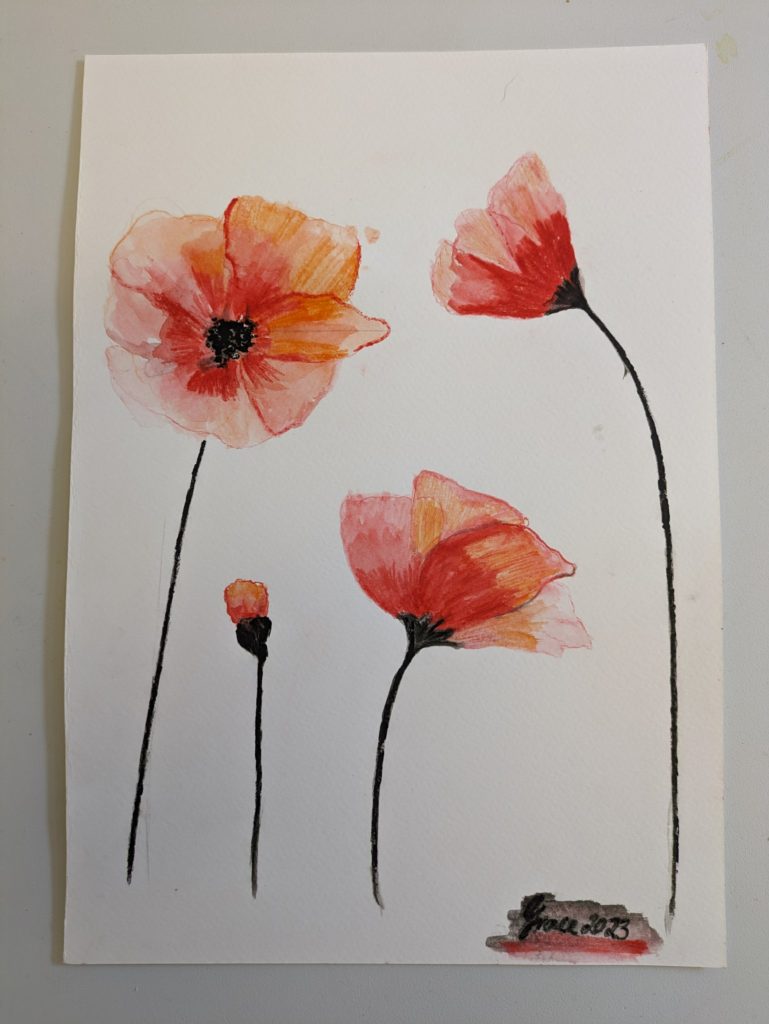
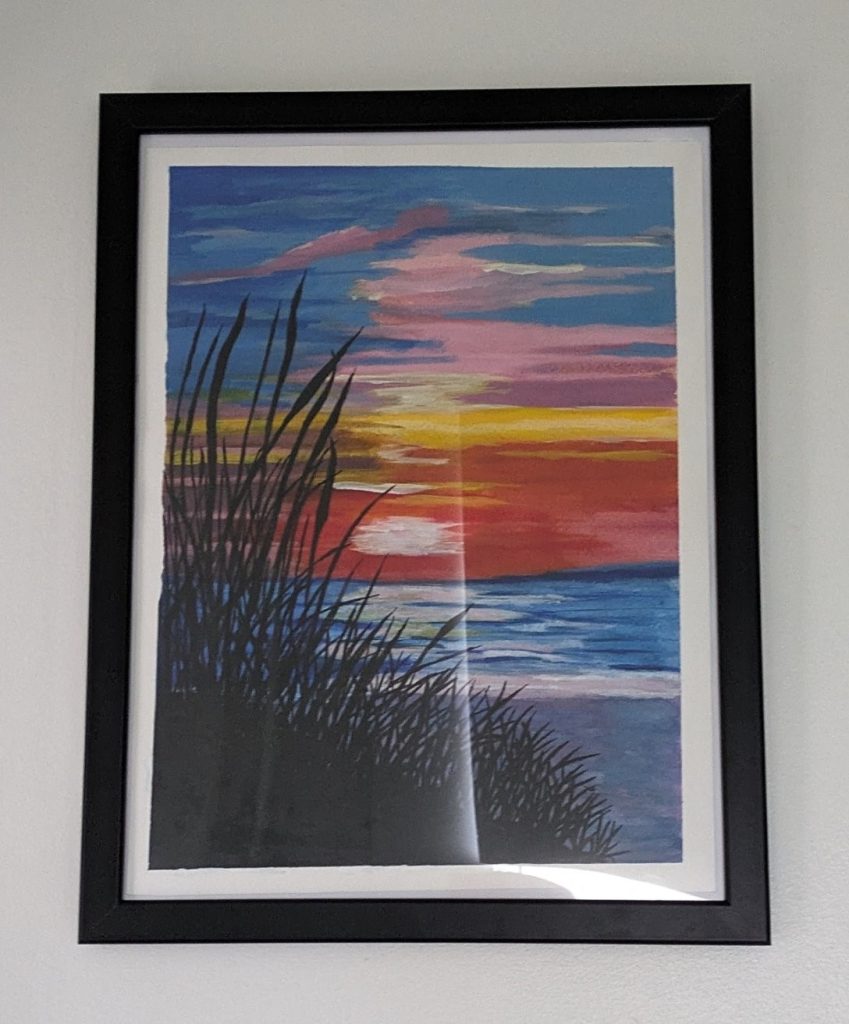
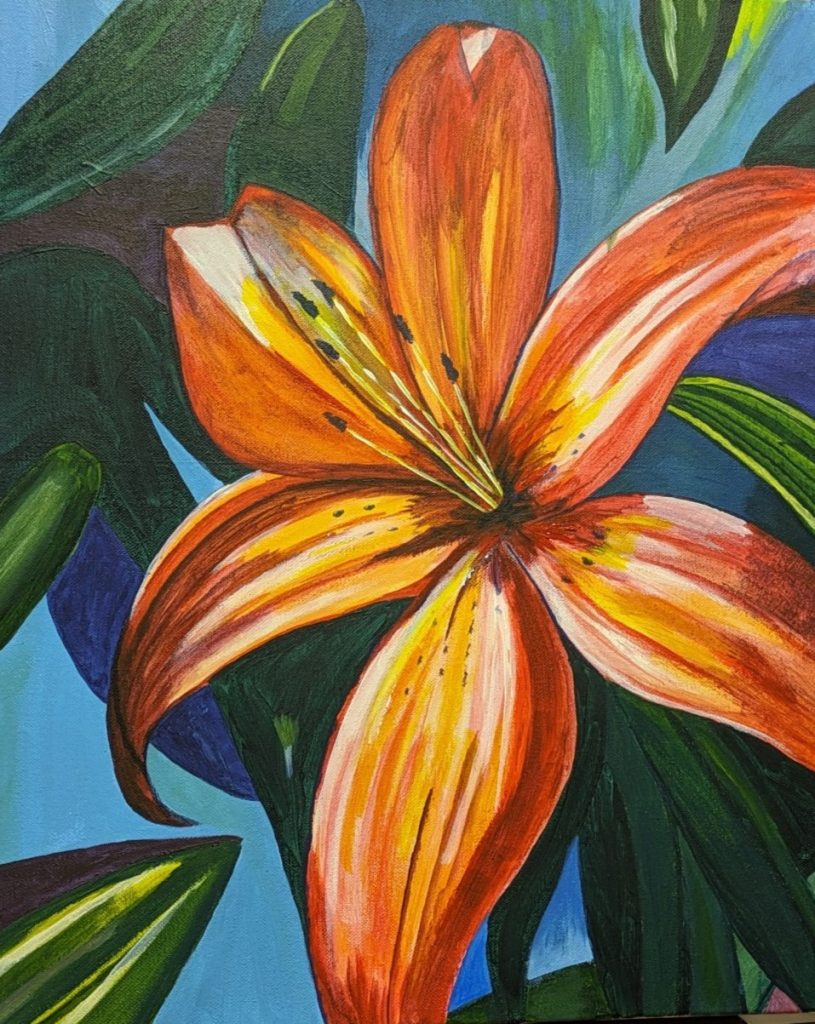
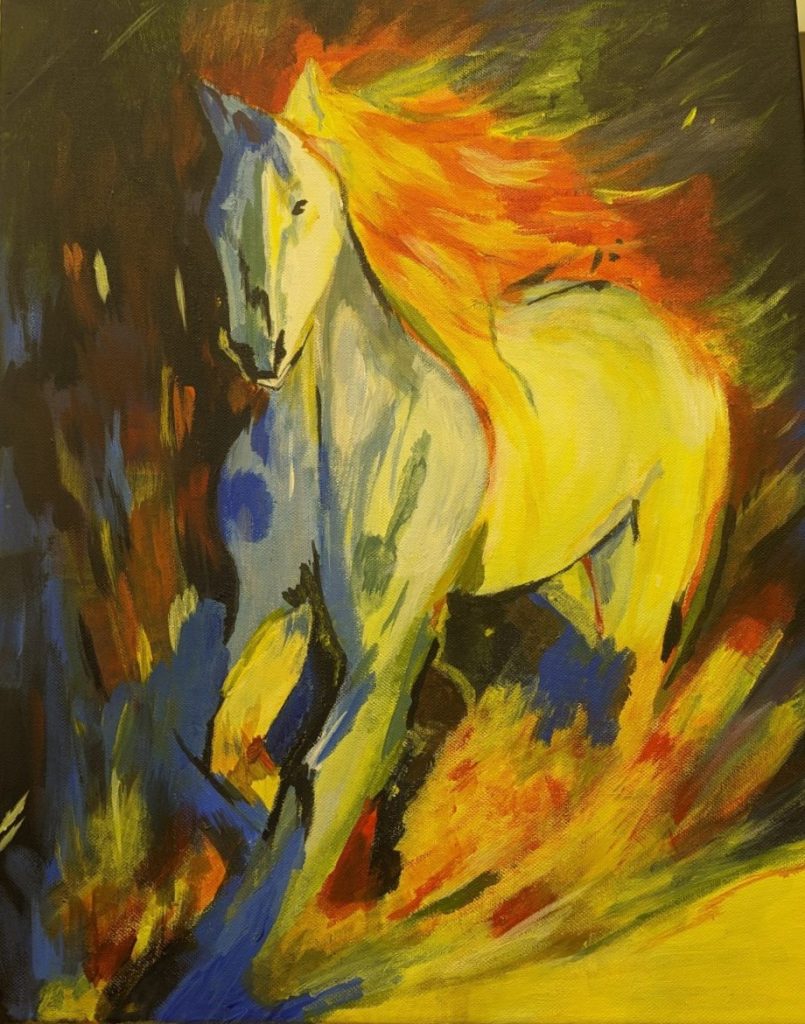
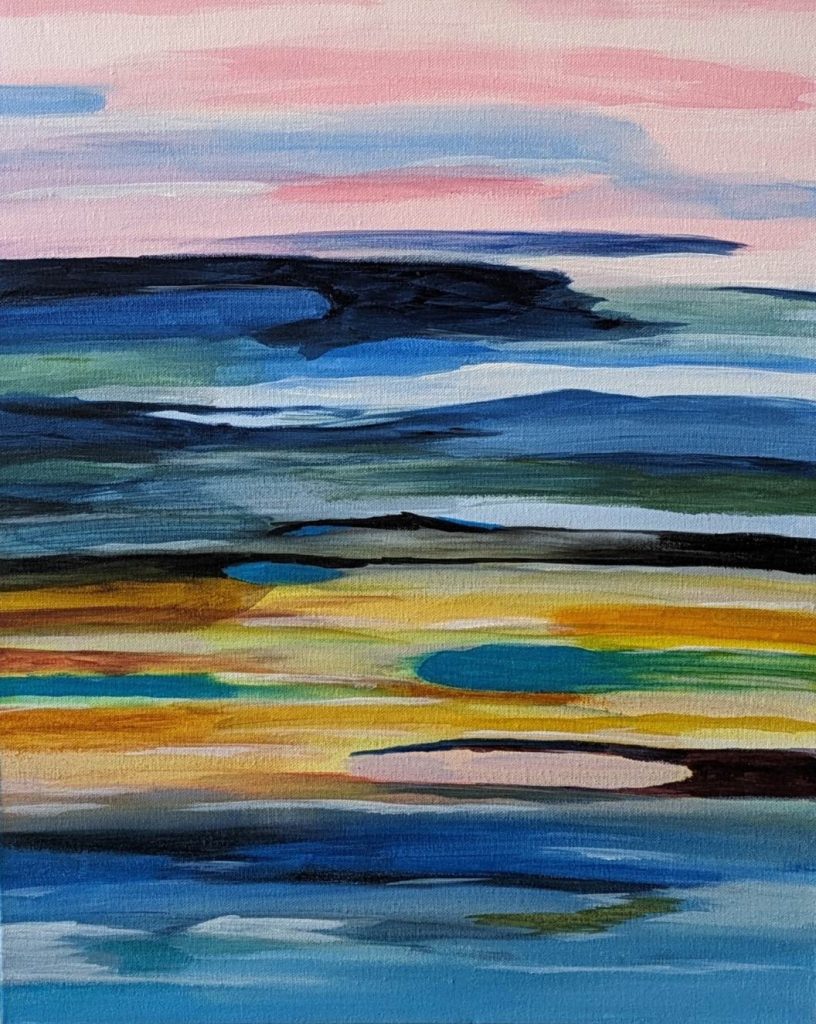

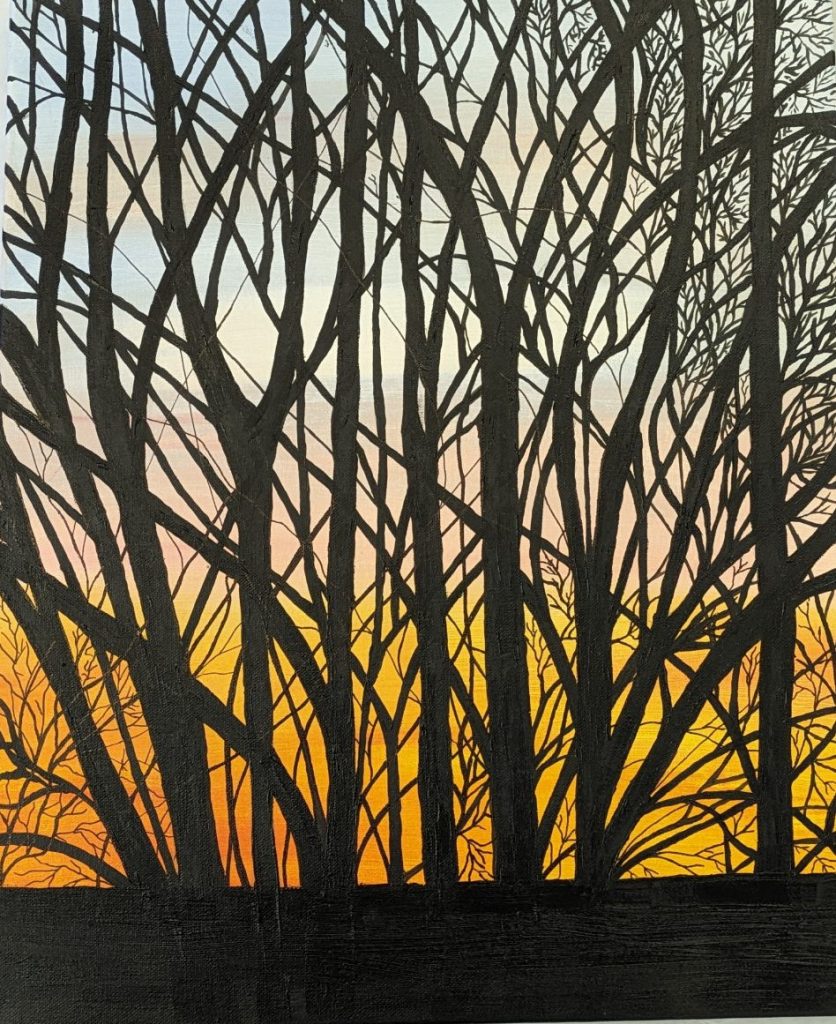
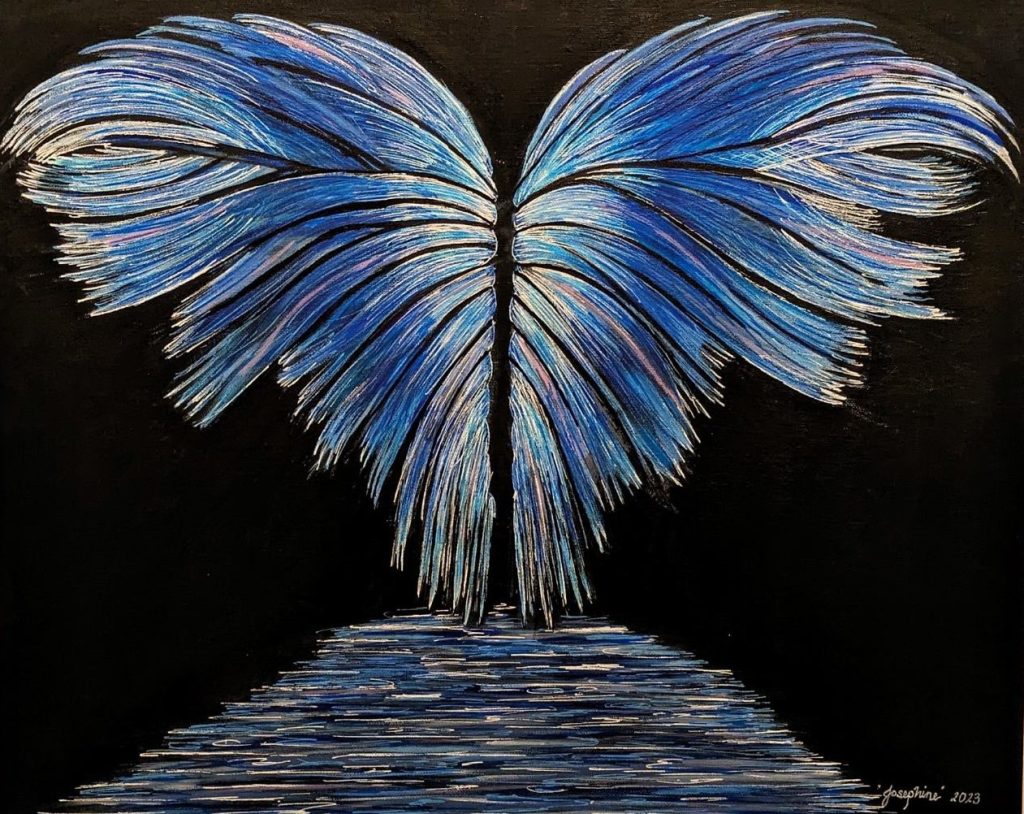
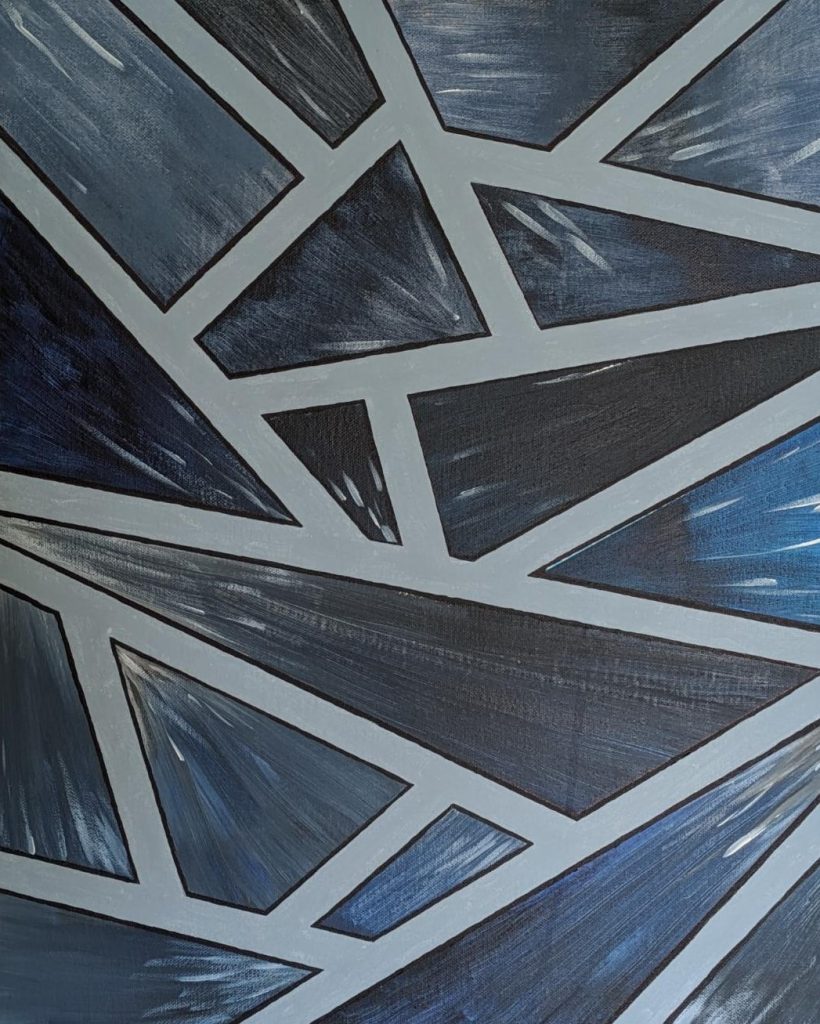
Flora Henderson, Alliance Manager, explores our relational approach at Future Pathways.
Future Pathways is delivered by the In Care Survivors Alliance. It is one of the two services hosted by the Alliance (the other is Redress Support Service).
Our fundamental purpose is to help people who experienced childhood abuse and neglect in care to live happier, more fulfilled and more independent lives, recognising and being sensitive to the profound impact of traumatic experience – and tailoring support to set the conditions for positive connection and improving quality of life.
Since Future Pathways began, we have taken a relational approach to working with people.
We do this because we know that a positive relationship can be both an outcome in its own right, and a powerful enabler to accessing other supports.
Trust is a hugely important part of this; it is fundamental to making a connection and to building bridges to other supports and resources. This is especially important for people who may have been let down and poorly served by professionals in the past or may have a deep mistrust of services.
We decided, therefore, to centre trust in how we think about and measure the difference we make.
And we decided to be iterative, so we can apply what we learn immediately, constantly aiming to do our best by and for the people we work with.
For a number of years, we have worked with Matter of Focus. Together, we use impact measurement to drive insight and innovation. And by investing in impact measurement, we have an evidence-based way of reflecting on our work, developing the courage to test new ideas and adapting when we need to.
Measuring our impact helps us to consolidate what is most important about our approach in a robust way.
As such, as we now have real confidence in the importance of taking a relational approach, with a strong evidence base about what works and how.
It has helped us take a hard look at what being person-centred and trauma informed means in practice, with effects ripping out across how we work as colleagues, as commissioners of support and as contractors with Delivery Partners, as well as how we respond to feedback and complaints. Our relational approach invites the participation and contribution of everyone who is involved in and benefits from the service.
Measuring the impact of our relational approach has been central to developing an understanding of what ‘good support’ looks like and feels like to people, who have been seldom heard, or well served by existing services.

Redress Support Service can support you if you are applying to Scottish Government’s Redress Scheme, or if you are thinking about applying.
The service offers personalised support to people throughout their redress journey. This includes talking through your needs in relation to your Redress journey, including practical and emotional support.
There is tailored support provided by Link Workers and by delivery partners. There is also connection with other specialist support organisations who can help you find your records.
The service can support you to prepare for applying, during the application and after you have applied.
If you’re going through the application process for the Redress Scheme and would like to speak to someone about how you are feeling, contact the Emotional Support Helpline:
Phone for free: 0800 211 8403
The Helpline can also support you if you are thinking about applying for redress but haven’t made the application yet. You can also contact the Redress Support Service if you have already submitted your application.
Lauchlan, who is registered with us, shares these two reflective poems.
Talking to myself
Write go on write I’m talking to my pen
Oh what a clever writer to write when I say when.
The crimson skies the rushing waves I’m thinking in my head
Oh what a clever thinker to think what I just said.
It is really such a lovely life it’s me who’s telling you
I know it’s me who’s talking but to whom am I talking to.
I’m really just a splendid chap rich in thought and health
but guess what I discovered I am talking to myself.
Thoughts
A thought a thought it’s just a thought my mind will think again to think of all the thoughts
I’ve had would cast me out in shame.
I thought I was a rock star my mind was running wild selfish thought’s all for myself sometimes
I’m like a child.
I thought I was a Christian to the world I’d be so good but it’s to the devil my soul I gave and
the words I speak are rude.
I thought I was a politician I’d save the world’s cries but I’m not different from the rest
I’m a liar in disguise.
I’ve thought in many ways of folk
But it’s just a shot in the dark life is good and bad at times.
What do you think well there’s a thought.
Chris, who works with us, has been drawing for many years, using charcoal and, more recently, coloured pencil. Some of his work was recently shown in an exhibition in Glasgow. He told us about the exhibition, and about another way that he sometimes shares his work with others…
Chris has been working with Future Pathways for several years. He has been keen on drawing for as long as he can remember, and it has developed over the years. Chris told us:
“I used to mostly draw with a charcoal pencil – so that’s in black and white. But during lockdown I started coming out of my comfort zone a bit, and started doing colour drawings with graphite pencils. My friends often told me that they like them when I shared them on Facebook, and that the colour drawings cheered them up.”
Chris mentioned all of this to his Support Coordinator, and this started a discussion which ended up with them arranging an exhibition of Chris’s work in the Woodlands Community Meeting Room in Glasgow.
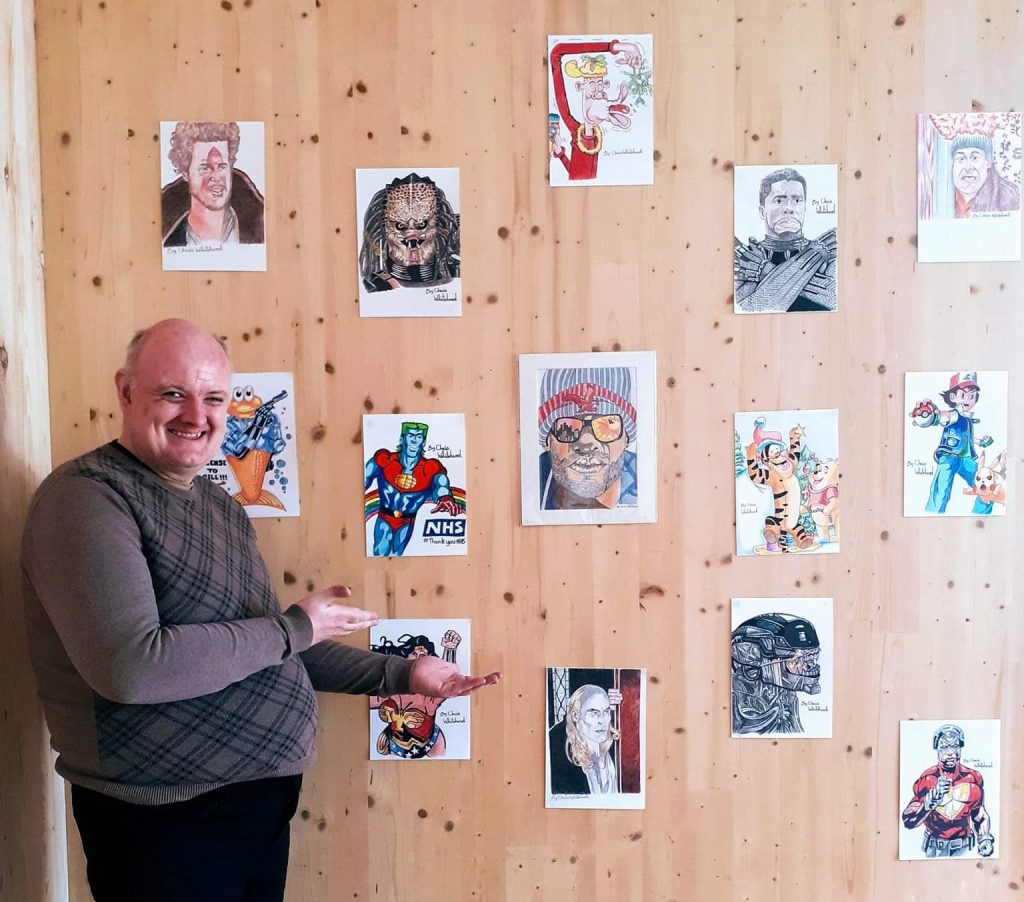
Above: Chris’s with his artwork on display at the Woodlands Community Meeting Room in Glasgow
Many of Chris’s drawings are of people, but they’re not all real people. Chris says: “I draw lots of stuff. I do things from TV shows or movie characters, or I’ll do cartoon characters or I’ll do superheroes. Things along those lines.”
But not all of Chris’s work is of made-up characters: “I sometimes draw bands of musicians and things like that.” And Chris uses this as a chance to share his work in a really lovely way.
“I go along to shows – plays or concerts – and I’ll pick a member of the band or the cast. Obviously I can’t draw them all, but I’ll draw someone. And then after the show, I’ll go to the stage door and I’ll present them with the drawing. Just as a little gift for them. People almost always ask if they are allowed to keep it! And I say, ‘Of course, that’s what I’ve done it for, it’s for you to take away.’ And they’re delighted. People giving me hugs and sometimes they’re nearly crying. It’s just very nice to see someone happy with something that I’ve done for them, and to see how much it means to them.”
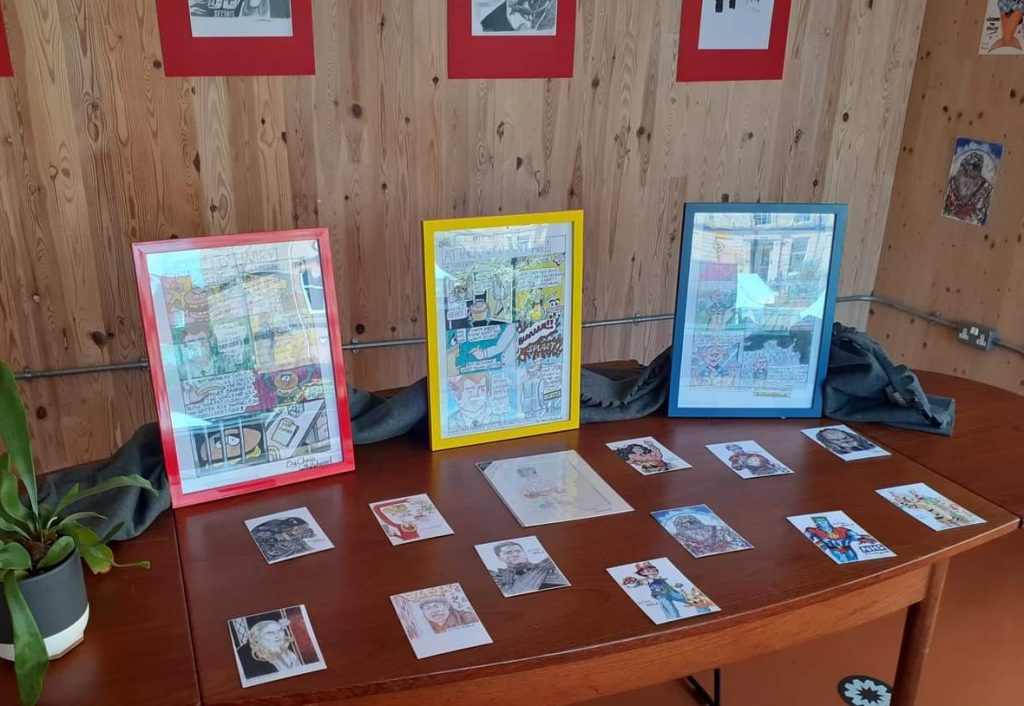
Above: Chris’s work in the Woodlands Community Meeting Room in Glasgow
At SCVO’s The Gathering 2023 we’ll be telling people more about who we are and what we do, as well as what we learned through creating our most recent impact report, Stepping Stones.
We will be sharing how we went about understanding our impact, especially the impact of our relationships with people. Created in collaboration with Matter of Focus, the report shines a light on the difference we make and how we make it.
We’ll also be highlighting key words from our work. Each of the words below is one of the themes we noticed from our conversations with people we support. At Future Pathways, we ask people how it feels to work with us. It helps us to improve our service and to learn.
